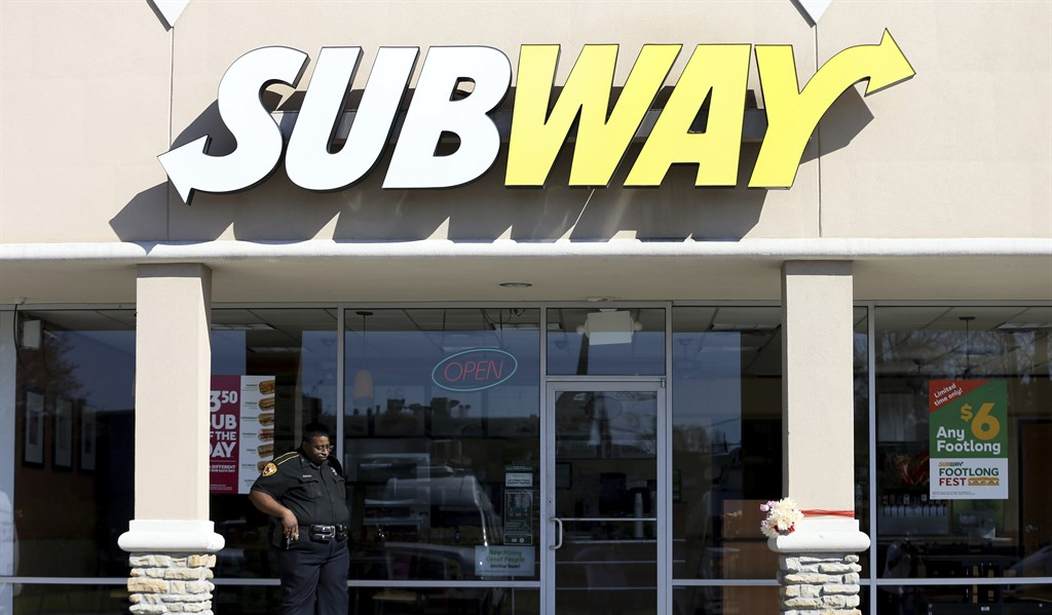Senator Elizabeth Warren is sounding the alarm. No, there's nothing particularly unusual about that. Warren "sounds the alarm" on anything that disturbs the natural order of the liberal universe. But this time, she's on to something.
Warren is warning about a "sandwich shop monopoly." It seems that Subway, the home of above average subway sandwiches, is being bought by the same company that owns Jimmy Johns and McAlister’s Deli, among other sandwich emporiums.
Subway, which is family-owned, agreed to sell its business to private equity firm Roark Capital in a blockbuster (good name for a sandwich) deal worth $9 billion. Along with Jimmy Johns and McAlister's, Roark also owns Baskin-Robbins, Dunkin Brands, Buffalo Wild Wings, and Sonic.
It's an empire, and Warren wants it rein it in.
I wonder how many Americans are vitally concerned about whether Subway is owned by a family or Roark Capital. Warren thinks it's a burning issue and she is asking the FTC to look more closely at the transaction.
Joe Biden's FTC has been unsuccessful at blocking any merger in court. It appears that not liking big business is not the same as legally being able to stop mergers. The Biden FTC should be concerned about competition, for sure. But as Reason.com's Steven Greenhut points out, going after an illusory "sandwich shop monopoly" is going a bit too far.
This is ludicrous for various reasons. I appreciate the value of a nicely assembled sandwich—and as a free-market advocate understand the complexities of running any type of business—but slapping lunch meats and condiments on bread is not some high-barrier-to-entry endeavor. Should a federal government that is nearly $ 34 trillion in debt and can't manage basic operations be micromanaging fast-food business purchases?
A monopoly is defined as "the exclusive possession or control of the supply of or trade in a commodity or service." To apply it to sandwich shops is incomprehensible. Subway is large, but is dwarfed by the number of independent delis. Increasingly, the federal government is expanding that monopoly definition to include any business that has a lot of market power.
Warren and her fellow radical leftists are opposed to success because it makes the "equity" argument a joke. It's not "incomprehensible" to apply the monopoly logic to a sandwich shop when a small sandwich shop owner struggling to stay afloat can't compete with Subway or Jimmy Johns.
Warren wants to blame the rise in fast-food prices on mergers, but the reality is that state-mandated minimum wages approaching $20 an hour bear far more responsibility for high fast-food prices than mergers.
Greenhut says don't bother trying to understand left-wing logic.
It's pointless to look for consistency. Progressives dislike the private sector and are incapable of blaming inflationary government policies given they always want more government spending and meddling. There always has to be a bad guy, and fast-food restaurants fit that bill for any convenient reason relating to nutrition, wages, mergers, rising prices, or over-sized portions. Tech firms get this treatment, too, as the Federal Trade Commission is targeting Amazon for offering customers really good deals.
Next time you get sticker shock at a sandwich joint (and I always recommend Jimmy John's Spicy East Coast Italian), remember that government policies are the reason. The FTC's new fight against sandwich "monopolies" is just the latest effort at deflection.
Give me the double ham and cheese and don't spare the mayo.










Join the conversation as a VIP Member